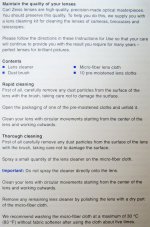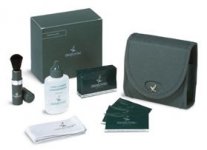elkcub
Silicon Valley, California

Etc,
The basic kit from Zeiss includes a 1 oz. bottle of lens cleaner, several pre-moistened cloths, and a microfiber cloth. The instructions are reasonably clear, although I don't use the microfiber at all. My preference is to apply and remove the cleaner using 3-4 fresh cotton balls. It's easy enough to do in the field, although a soft lens brush is usually sufficient to remove dust. Before the Zeiss cleaner was available I did the same thing with alcohol. Never had a scratch or cleaning mark. Coatings were never damaged.
Elk
The basic kit from Zeiss includes a 1 oz. bottle of lens cleaner, several pre-moistened cloths, and a microfiber cloth. The instructions are reasonably clear, although I don't use the microfiber at all. My preference is to apply and remove the cleaner using 3-4 fresh cotton balls. It's easy enough to do in the field, although a soft lens brush is usually sufficient to remove dust. Before the Zeiss cleaner was available I did the same thing with alcohol. Never had a scratch or cleaning mark. Coatings were never damaged.
Elk





